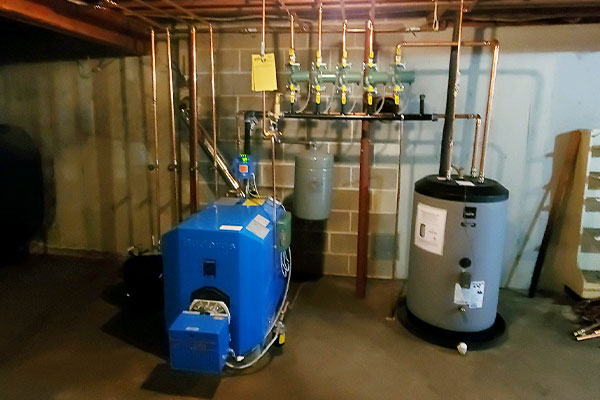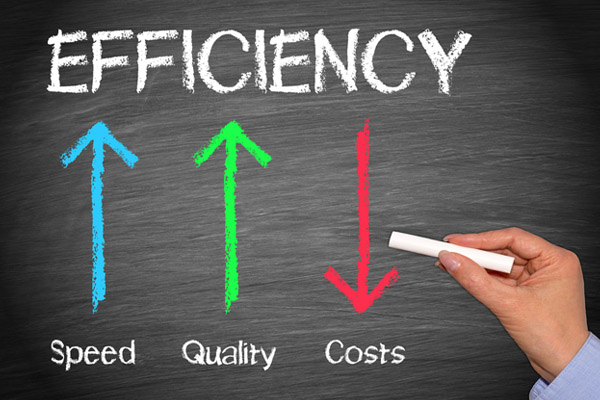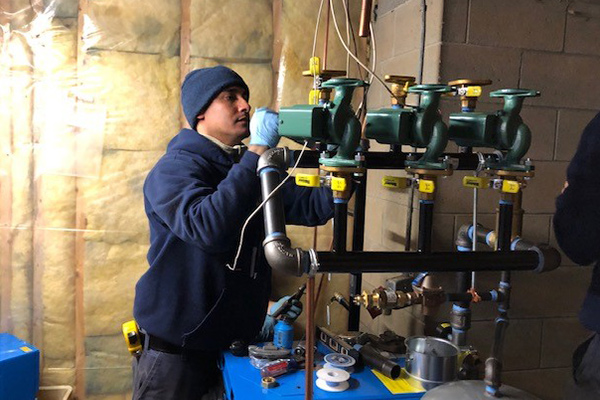Contents

Oil heating systems are not only cost-effective and efficient but also environmentally friendly. They are an excellent investment for your home. Newer oil heating systems boast impressive AFUE ratings, further enhancing their efficiency. In this article, we will answer the question, “How does an oil heating system work?”, by providing an overview of oil heating systems and their operation. We’ll also debunk some common misconceptions along the way.
Common Myths Regarding Oil Heating Systems

- Environmental Impact: Contrary to some misconceptions, heating oil burns cleanly and well within EPA air pollution standards. Technological advancements in equipment have made oil heating systems an environmentally responsible choice.
- Cost: Oil heating systems are not only cost-effective but also have a longer lifespan. They last about 30 years compared to propane and natural gas systems, which typically last 11-14 years. An oil heater can save you approximately 5% of your fuel costs.
- Safety: Heating oil is safe in its natural state, similar to diesel fuel. When stored correctly, there is no risk of explosion or safety concerns associated with heating oil.
How Does An Oil Heating System Work?

Heating oil systems use three main methods to warm your home: vents, baseboards, or radiators. Here’s how it works:
- Thermostat Control: When your thermostat detects a drop in temperature below your desired setting, it signals the heating system to start warming up your home.
- Oil Movement: Heating oil moves through a pump from the tank to the burner. At this point, it transforms into a warm mist, which combines with the air. This fuel-air mixture is then sent into the burner to ignite in the combustion chamber.
- Heat Distribution: Depending on the heating system type, the oil either heats air or water. If you have a central forced-air system, it is referred to as an air system, using ducts and vents to distribute heated air evenly throughout your home. On the other hand, hydronic heating systems, also known as water systems, heat water and send it to radiators or baseboards.
Related Article: The Best Ways To Prevent Running Out Of Heating Fuel This Winter
There are two primary types of heating oil systems to choose from:
- Furnace: A furnace heats the air, which is then distributed through your home’s ductwork. Newer models are more energy efficient, offering improved performance.
- Boiler: A boiler heats water. It then sends it to radiators or baseboards for heating. Like furnaces, modern boilers are designed with energy efficiency in mind, making them a great choice for efficient heating.
Efficiency Upgrades in Modern Furnaces

Modern minimum-efficiency furnaces outperform their older atmospheric counterparts. They incorporate a fan that directs exhaust air through a heat exchanger.
For optimal oil heating, newer condensing furnaces are the preferred choice. These furnaces minimize heat loss to the outside. Instead of immediately venting hot exhaust, they cool the gases first. This process causes water vapor to condense, and the exhaust is then expelled through a plastic pipe located on the side.
Related Article: Can I Really Use Diesel Fuel in My Home Heating Oil Tank?
Oil-Fired Boilers
Oil heating systems come in two primary varieties: hydronic boilers and steam boilers. Here’s how they operate.”
- Hydronic Boilers: These boilers heat water. The treated water circulates through the house, delivering warmth via radiators or baseboards. Once the liquid cools, it returns to the boiler for reheating.
- Steam Boilers: Although less common, steam boilers function by converting water into steam, which then travels through the system to provide heating via radiators.
The primary distinction between furnaces and boilers lies in their heating medium. Furnaces use air to warm your home, whereas boilers use water. In both cases, the oil serves as the fuel source. The process starts in the combustion chamber, where the oil ignites into flames. The heat exchanger also raises the temperature of the gases or water circulating through the system.
Related Article: How to Read Your Heating Oil Tank Gauge
Oil Heating System Maintenance

Maintenance of an oil heating system is essential to ensure optimal functionality and efficiency. Here are some key maintenance tasks:
- Thermostat Cleaning: Before the heating season begins, clean your thermostat. This allows for accurate temperature regulation in your home.
- Blower and Stack Parts: Regular maintenance of the blower and stack parts in your oil heating system is crucial. These components monitor the burner and help remove particles and debris that might impede the heater’s performance.
While there are tasks you can handle on your own, it is wise to enlist the services of a professional to perform a comprehensive check-up and make sure everything is in working order before the winter season arrives. A yearly cleaning and inspection are typically sufficient for your heating system to operate properly, reduce heating costs, enhance air quality, and provide increased comfort.
Environmental Benefits Of Using Oil Heating Systems
Oil heating systems are known for their ability to produce clean, warm air. Newer systems, in particular, have significantly reduced levels of smoke and combustion debris within your home and in the environment. According to the EPA, oil burners are among the cleanest combustion sources available.
The storage of oil tanks poses no threats to your health or the environment, provided they are properly maintained. Well-maintained tanks can last for several decades. Heating oil is non-toxic. It does not contain carcinogens. It is biodegradable.
Investing in an oil heating system offers several environmental benefits. In addition to being cost-effective and having a long lifespan. These systems contribute to environmental preservation by emitting minimal smoke and debris into the air. This makes them a responsible choice for both your home and the planet.
Related Article: Clean Energy Fuels: How Renewable Biofuels Can Help Solve The Climate Crisis
Conclusion
Now that you know all the advantages of an oil heating system and how it operates, you might consider upgrading it. Modern systems not only benefit the environment but also offer long-term cost savings.
Before the cold winter months arrive, have your heating system inspected by a professional. An experienced HVAC contractor can give you peace of mind knowing that your heating system is in good working order and will not malfunction. Do not forget to schedule a maintenance or tune-up appointment for your heating system today to make sure it performs optimally!
Related Article: What Do Heating Oil Additives Do?
Call Wilcox Energy For Reliable Heating Oil Deliveries & HVAC Services

For top-notch service and competitive prices on heating oil deliveries and HVAC services, contact Wilcox Energy as soon as possible.
We offer a broad range of fuel delivery plans and financing options, which allow you to customize your oil deliveries to meet your specific needs. We also deliver Bioheat® heating oil, a blend of ultra-low sulfur heating oil and biodiesel. This liquid renewable fuel makes your home more eco-friendly and your heating system more efficient. It comes to you without any added cost. In addition, we perform heating system repairs and maintenance for the purpose of enhancing the overall efficiency and functionality of all your home heating equipment. Contact Wilcox Energy for all of your residential heating needs. Click the link to view our service area.
For more information about our heating oil deliveries or HVAC services, be sure to contact Wilcox Energy. You can click here to contact us or call us at (860) 399-6218. Call now!
